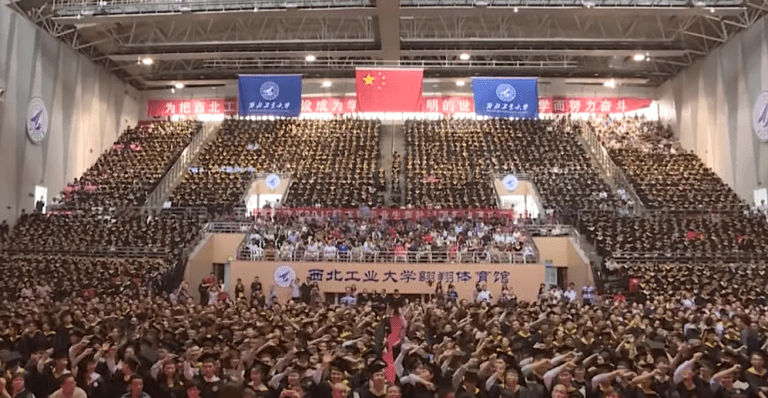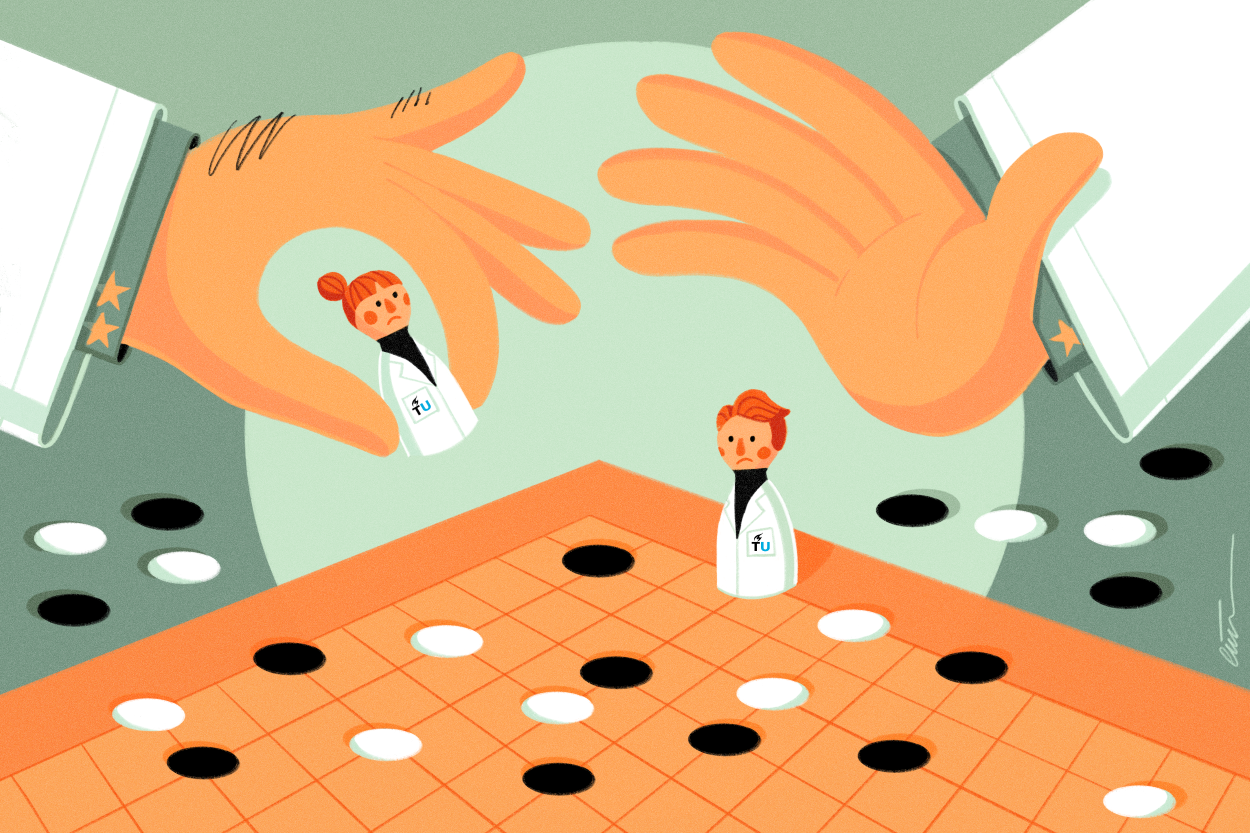TU Delft has official ties with Chinese universities that are closely allied to the Chinese army. Experts warn that ‘There are significant risks in some areas’.
China is playing a completely different game, Go. A game with different rules and different pieces.” (Artwork: Liam van Dijk)
What does this article discuss?
- TU Delft scientists regularly work with Chinese researchers on technologies that could benefit the Chinese army.
- In particular, undesirable knowledge transfer in collaborating with four universities that, along with three others, are known as the Seven Sons of National Defence is not without risks, say security experts.
- TU Delft does not have a clear picture of its links with Chinese universities.
- Some TU Delft scientists would not do research with the Seven Sons again: ‘The risks are too great.’
- TU Delft is working with the Dutch Government and other universities on a new China policy.
In collaborating with China, are universities giving more knowledge away than is wise? Scientists and universities are struggling with this question now that think tanks and research institutions are emphasising the risks associated with joint research with China. Yes, they admit there are many advantages. Just two of these are the money that Beijing is willing to invest in research, and the many large facilities in the country. Dutch universities can only dream of these. These experts do, however, also warn of espionage, undesirable knowledge transfer and the new close links that Chinese universities have with the defence industry. Then there is the direction that the Chinese President Xi Jinping is taking. He is dreaming of being technologically independent of the rest of the world by 2025, and having the most advanced army in the world by 2049. Xi makes no secret of China using science to develop its military.
At central, faculty and individual levels, TU Delft has scientific contact with dozens of universities all over China. Take TU Delft’s centrepiece: the joint research centres with four Chinese educational institutions in various fields including water management and sustainable infrastructure, fields in which TU Delft is outstanding. Several of the Chinese universities with which TU Delft works belong to the crème de la crème of Chinese science. The top universities that are collectively known in China under the term Seven Sons of National Defense are each leaders in their fields, such as aviation, aerospace and maritime technology. Delta research shows that TU Delft has close ties with four of them. And TU Delft scientists have co-published with colleagues from all Seven Sons universities. It makes sense for a university that promotes itself abroad as the ‘MIT of Europe’.
Links with the army
However, this is not the whole story. According to Australian and American researchers, there is more to the Seven Sons than meets the eye. ASPI’s China Defense Universities Tracker assigns these universities the highest security risk. ASPI is an Australian think tank co-financed by the Australian army. The Seven Sons fall under the Ministry of Industry and Information Technology (MIIT) that, under the aegis of the governmental organisation SASTIND, monitors the Chinese defence industry. While officially they are civil universities, according to ASPI they have close ties with the Chinese army. Half their research budget is known to go on military research, such as on the development of rockets, facial recognition technology, military aircraft and satellites.
Delta research shows that TU Delft has or has had cooperation agreements with the four universities below over the last 15 years.
- Beihang University, specialised in aerospace. In 2018, Beihang University signed a strategic cooperation agreement with the state owned China Aerospace Science and Technology Corporation (CASC), the main contractor of the Chinese space programme and producer of ballistic rockets and satellites.
- Harbin Institute of Technology (HIT), specialised in areas such as aerospace, satellite technology, IT and robotics. HIT has shared a research centre with CASC since 2008.
- Northwestern Polytechnical University (NPU), specialised in aerospace, maritime technology and armaments. On its website, NPU states that it is dedicated to ‘improving and serving the defence technology industry’. The university has a daughter company, Aisheng Technology Group Co., Ltd., that is said to produce 90% of Chinese drones and whose biggest customer is the People’s Liberation Army.
- Beijing Institute of Technology (BIT), specialised in armaments and aviation. BIT says that it produced China’s first light tank.
Each of the universities has one or more Memorandums of Understanding (MOU). The agreements in the MOUs cover student exchanges, joint research, the exchange of PhD positions or the joint teaching of personnel and students. The TU Delft Faculty of Aerospace Engineering (AE) has signed agreements with all four of the Seven Sons mentioned above.

Students of Northwestern Polytechnical University gather in the main hall. (Source: Still from Youtube).
TU Delft is also in contact with three other Seven Sons universities, but this contact is usually limited to joint publications from individual scientists or research groups. TU Delft is not the only (in Dutch) Dutch university that has links with the Seven Sons. Erasmus University Rotterdam, the Technical University of Eindhoven, Wageningen University, the University of Twente and the University of Groningen have also signed MOUs with Seven Sons universities. Furthermore, over the years, at least 29 Chinese military scientists have carried out research at TU Delft. More about this in the second issue of our series about cooperation with China.
Research with military applications
Collaborating with the Seven Sons universities is not automatically bad news, says Ingrid d’Hooghe, who mapped scientific cooperation between Europe and China for the Leiden Asia Centre. While the Defense University Tracker views all the Seven Sons as risky, some faculties at these universities may be independent of these risks. Nevertheless, Dutch knowledge institutions should be cautious, say researchers. D’Hooghe says that “There may indeed be significant risks in some areas.” Think tanks such as ASPI and Hoover believe that the rub lies in the dual use research that fits China’s strategic policy plans. Dual use research is research or technology that has both civilian and military applications. Wadden research in China may be a good opportunity. But for radar technology or drones, for example, the research can be used completely differently than TU scientists intend.
‘TU Delft is outstanding in some of the technological areas that are of strategic importance to Beijing’
Under Chinese President Xi Jinping Beijing is showing more and more interest in dual use research. President Xi can really use the scientific and technological knowledge of universities in his dream of leading China towards having the most advanced army in the world. According to the American Government, China is mostly interested in quantum computers, big data, semi-conductors, 5G, advanced nuclear technology, aerospace technology and artificial intelligence. The Dutch AIVD (General Intelligence and Security Service) also puts maritime technology on China’s wish list. D’Hooghe says that Chinese universities have learned exactly where to ‘obtain’ knowledge and seek out collaboration with the relevant institutions in specific fields of research. “This is why TU Delft has such a huge collaboration with China. TU Delft is outstanding in some of the technological areas that are of strategic importance to Beijing,” she says. While Delta has chosen to look at the Seven Sons universities, as this is where most of the concerns lie, it does not mean that cooperation with other Chinese universities can be assumed to be safe. “All universities in China have close ties with the Chinese government,” continues d’Hooghe. “It is advisable to carefully consider the risks and benefits of cooperation and in doing so, not only look at the security risks, but also look at your own knowledge position in the long term.”
To get an impression of the type of research that TU Delft scientists are doing with Seven Sons colleagues, Delta examined 350 scientific publications. Most of them were published after 2014. The varied subjects include facial recognition software, robotics, aircraft materials and engines, radar technology and improved soldering techniques. Thus, knowledge that is, in part, on China’s military wish list. The editors also contacted 16 TU Delft authors of 350 publications to ask how they rate the chance that the acquired knowledge is being or will be used in China for military purposes. All the scientists that Delta spoke to say that the knowledge is already public. It is all published in articles in scientific journals which anyone can access. However, this is not the whole story. There are more benefits that the People’s Liberation Army derive from the collaboration than only open access knowledge. Chinese scientists also learn research and collaboration skills and have access to unpublished raw data.
‘I do not get involved in the implementation of technologies. That is up to industrial partners’
In correspondence with Delta, Professor Georg Eitelberg, who holds the Flight Performance & Propulsion Chair (AE), does not beat around the bush. He says that almost all technological research can be used for military purposes, and this is definitely the case in his work. Last year, he and three colleagues from Beihang University published an article on propellers and aircraft wings that are more aerodynamic. ‘Knowledge about the aerodynamics of wings can be used in developing military spy drones,’ he states. ‘More efficient propulsion methods can serve to transport military goods noiselessly over long distances.’ Eitelberg sees the dangers, and yet he has worked with Beihang University for years. ‘I do not get involved in the implementation of technologies. That is up to industrial partners.’ Regulations should be made at that level, he believes.
This does not mean that the Professor is unaware of the relationships. ‘What you need to watch out for is that the other party learns more from you than the other way around. The balance in our work is good. We work hard on less noisy propellers and are making great progress. If our work helps the people around airports to sleep better, everyone benefits.’
Working with military research institutions
Eitelberg’s research typifies dual use: it is of interest for both civilian and military uses. This applies to the vast majority of the studies that Delta looked at. Some publications stand out. There was a study in 2019 on the engines of a supersonic passenger aircraft that could fly four times faster than sound (Mach 4). In this study, a simulation of an aircraft engine (a supersonic combustion ramjet, or scramjet for short), TU Delft researcher Feijia Yin of the Aircraft Noise and Climate Effects section at AE worked with colleagues from Beihang University and from two other Chinese research institutions.
‘Research into scramjets for military uses is highly interesting’
Danny Pronk, former employee of the intelligence agencies AIVD and MIVD (Dutch Military Intelligence and Security Service) and now a defence expert at the Clingendael Institute, calls the civilian aspect of the research very thin. “For decades people have been dreaming of passenger aircrafts that fly faster than the speed of sound. But in all these years, there has only been the Concorde that ‘only’ flew at Mach 2 and was not commercially viable. All other initiatives have been dropped. An aircraft that flies at Mach 4 will proportionately use a lot more fuel and will never be viable. In contrast, research into scramjets for military uses is highly interesting.”
The other two research institutions involved in the study have, according to Delta research, links with the Chinese Liberation Army and the Chinese air force. These are the Aero Engine Academy of China and AECC Sichuan Gas Turbine Research Establishment, which both fall under the Chinese state owned Aero Engine Corporation of China, also known as AECC. China founded AECC a few years ago when it had a dearth of knowledge of powerful aircraft engines. The AECC and its various daughter institutions were tasked with remedying the situation. “They have managed to do this well,” says Pronk. “You now see for the first time that air force fighter jets – such as the J10 and J20 – have Chinese jet engines instead of Russian bought ones.”
Blacklist
Last year, the American Government placed eight of AECC’s daughter institutions on the blacklist: its so-called Military End-User List. American researchers, companies and institutions may not export knowledge or goods to these research groups because of the latter’s military aspirations. Research by Delta reveals that Sichuan Gas Turbine Research Establishment is also on this list, though under a previous name that was used prior to 2016 when it fell under a different state owned company. China calls these types of lists politically motivated. Pronk says that “Apart from who sits in the White House, the American security services have a good picture of the threat posed by China in the area of knowledge security. As a Dutch knowledge institution, it is not forbidden to work with institutions on the list.” Pronk believes that science needs to ask itself how wise it is to help institutions with military links jump technological and scientific hurdles. “There are geo-political ramifications if you help the army of a country that is clearly positioning itself as a rival of the West move forward.”
The other research institution, the Aero Engine Academy of China, is not on the blacklist but it also has military roots. Delta discovered that in 2017, it was subject to an inspection of which representatives of the air force were a part. Pronk points out that this shows that the institution has links with the Chinese air force.

A slogan on the website of the Aero Engine Corporation of China about the importance of a powerful army and serving the country though technology and science.
TU Delft researcher Feijia Yin announced in an email that, at that time, she saw no harm in the collaboration because the ‘conceptual’ research is on ‘civilian aircraft’, and that she and her colleagues are primarily working on obtaining ‘knowledge from manuals’. The question is, would she again work with AECC Sichuan Gas Turbine Research Establishment after we pointed out that it was on the blacklist? She said she would not do so. Dick Simons, Professor of AE’s Aircraft Noise and Climate Effects section, where Yin works, is more clear about this. “Given the potential risks, this is out of the question.”
Incomplete overview
Rejecting collaboration in some sensitive areas, such as aircraft research, is out of the question, says Rector Magnificus Tim van der Hagen. “That research may well help make aviation more sustainable. Furthermore, any technology can be used by the military. What is important is that you know who your partner is, who is paying that partner, and what the intrinsic motive is of that partner. That is far more important than trying to figure out if every technology could be misused. The answer is usually, yes it can.”
To answer these type of questions, d’Hooghe believes that it would be helpful if universities know exactly who they are working with. This is not the case. TU Delft does have a list of Chinese research partners, but it is not a complete list. “We do not have a picture of all the individual partnerships,” says TU Delft’s former Vice Rector Peter Wieringa, who has been appointed TU Delft’s China Ambassador. “We do have a fairly good idea of the main partnerships, though. However, I do not dare say with certainty that this is complete.” A list that Delta was able to see does contain university-wide cooperation agreements, but not all faculty ones. Other Dutch universities also do not have complete lists of all their Chinese partners, wrote the Central Government in November 2020.
Help for individual scientists
Both Van der Hagen and Wieringa admit that there is a degree of tension between free and open research with Chinese scientists on the one hand, and the military aspirations of China on the other. Rector Magnificus Van der Hagen says that there is a clear shift in the academic world. “Five or 10 years ago, the mantra was that ‘China is the place to be’, and you needed to be part of it. This has now changed.” Research such as that of d’Hooghe and ASPI played an important part in this. In recent years, they emphasised the risks of Dutch university partnerships with China. Van der Hagen continues. “Instead of continuing to encourage cooperation, we need to concentrate more on determining whether certain types of cooperation fit our norms and values.”

A building on the campus of Harbin Institute of Technology. (Source: Still from YouTube).
In November 2019, TU Delft hired its first China Senior Policy Advisor: Peter Gill. To guide researchers who are wondering whether they should work with Chinese colleagues or not, he is working on the Partnering with China — Concrete Tools for TU Delft manual, which outlines all the steps that scientists should go through. The manual also contains the Checklist for Collaboration with Chinese Universities and Other Research Institutions, that was produced by The Hague Center for Strategic Studies. The checklist was issued to all Dutch universities in 2018. In contrast to other universities such as Leiden University and Radboud University, TU Delft had not yet disseminated it widely. TU Delft is, however, doing more now. It is in consultation with other universities and three ministries to address the China question.
All the academics that Delta approached agree on one thing: scientifically, you cannot avoid China. d’Hooghe and the Executive Board share this opinion. However, says defence specialist Pronk, it is then useful if you know the game that China is playing. “Here in the West, we tend to think that we are playing chess with China. But China is playing a completely different game, Go. A game with different rules and different pieces.”
Annebelle de Bruijn and Tomas van Dijk
This article is part of series about academic cooperation with China. Read our other stories:
- The military: about Chinese military scientists who come to TU Delft to acquire knowledge for the Liberation Army.
- Striking a balance: TU Delft scientists talk about their considerations in working with Chinese counterparts.
- The history: about how the view of collaboration with China has changed over the years.
- Our journalistic statement of accountability on the hows and whys of our China-investigation.
Do you have a question or comment about this article?
a.m.debruijn@tudelft.nl


Comments are closed.